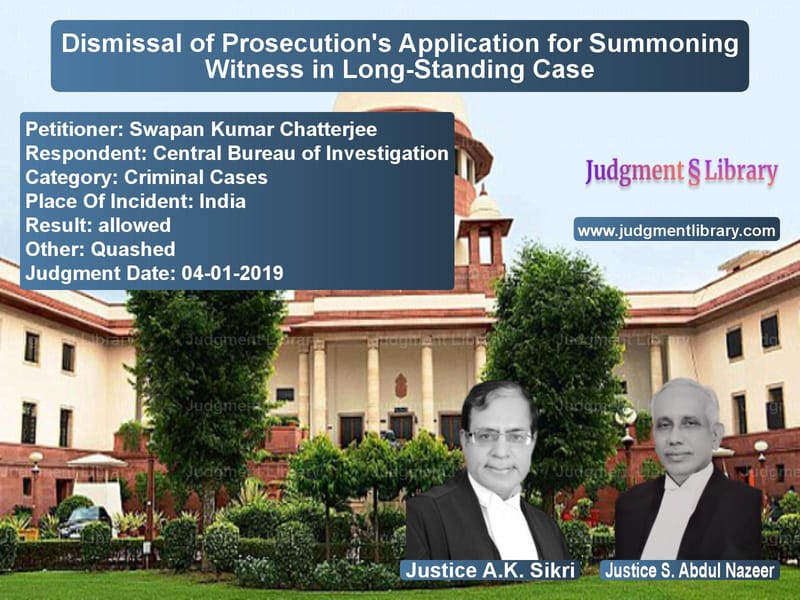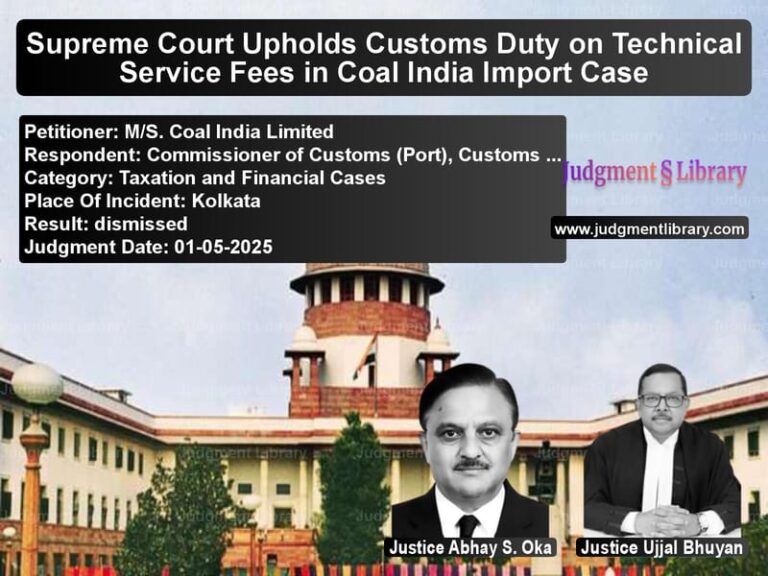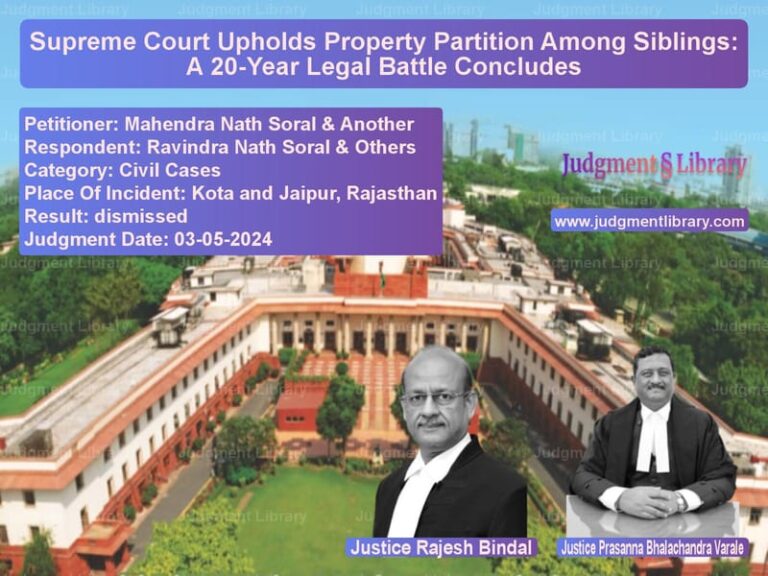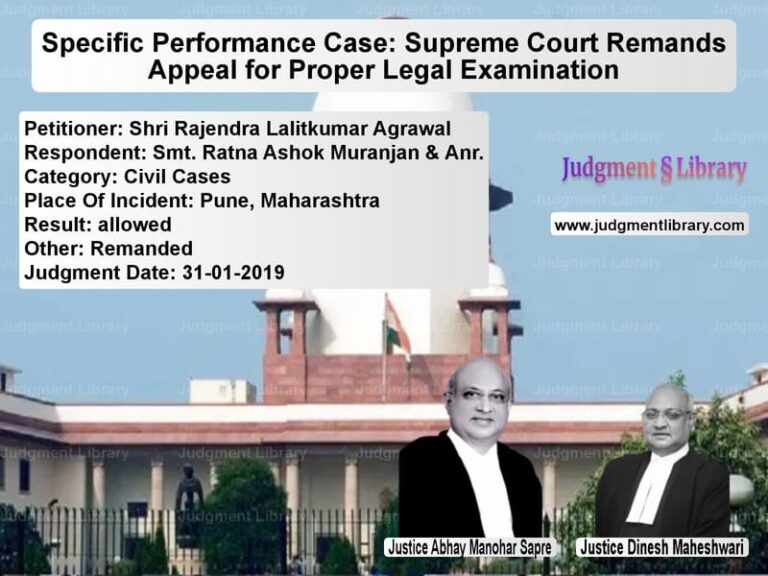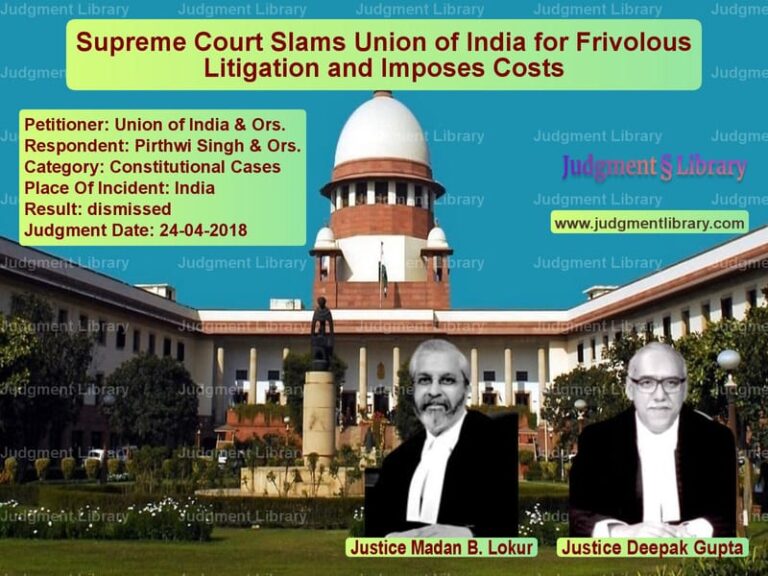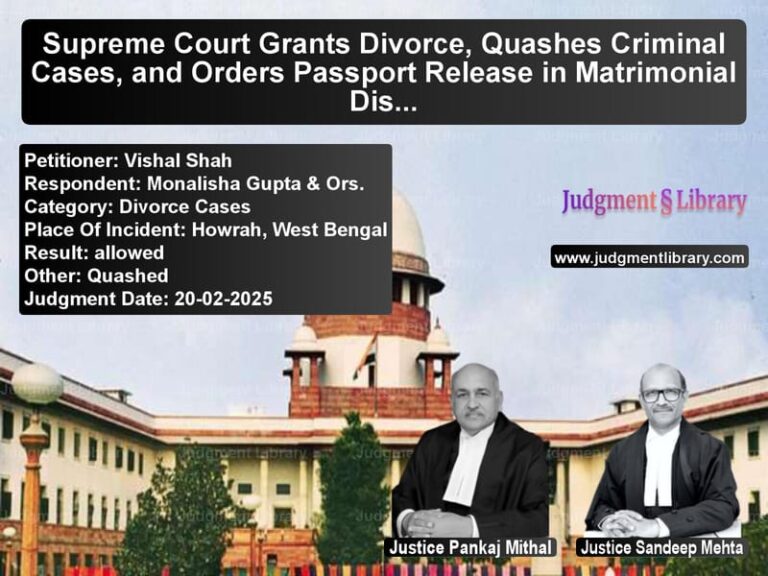Dismissal of Prosecution’s Application for Summoning Witness in Long-Standing Case
The case of Swapan Kumar Chatterjee vs. Central Bureau of Investigation concerns a contempt petition that arose from the ongoing trial of the appellant in connection with charges under the Indian Penal Code, including sections 477A, 471, 468, 420, and 120B. The dispute centers on the prosecution’s repeated failure to procure the attendance of a key witness, Mr. H.S. Tuteja, a handwriting expert, whose examination had been sought by the prosecution to strengthen its case. The case has been pending for several years, with multiple applications filed by the prosecution to summon Mr. Tuteja, none of which resulted in his appearance before the court. The case has brought into focus the importance of adhering to court orders and the discretion of the judiciary in managing the progress of trials.
Background of the Case
The appellant, Swapan Kumar Chatterjee, was implicated in a fraud case involving forgery, falsification of documents, and financial misconduct. The prosecution sought to examine Mr. H.S. Tuteja, a handwriting expert, in 2004. However, despite multiple orders and extensions given by the court, Mr. Tuteja’s examination was delayed repeatedly, leading to the appellant’s request to dismiss the application for his examination. The prosecution’s inability to produce the witness in court despite numerous opportunities led to the filing of this appeal.
Throughout the trial, spanning more than a decade, the prosecution’s repeated requests to summon the handwriting expert were met with failure. The High Court had earlier granted a last opportunity for the prosecution to procure the attendance of the witness in 2011. Despite this, the prosecution continued to file applications, each of which was allowed, leading to the appellant’s contention that the delay had caused undue prejudice to his right to a fair trial.
Petitioner’s Arguments
The appellant, represented by his legal counsel, argued that:
- The prosecution had repeatedly failed to procure the attendance of Mr. H.S. Tuteja, despite numerous orders and extensions.
- The trial had been delayed for over a decade, with no satisfactory explanation for the failure to produce the key witness.
- The High Court had already granted the prosecution a final opportunity to present the witness in 2011, and further delays were causing severe prejudice to the appellant.
- The continued delay violated the appellant’s constitutional right to a speedy trial and was detrimental to his defense.
Respondent’s Arguments
The respondent, represented by the Central Bureau of Investigation (CBI), argued that:
- There were valid reasons for the repeated delays in securing the attendance of Mr. Tuteja, including scheduling conflicts and the unavailability of the witness.
- The prosecution was acting in good faith and had made diligent efforts to present the witness in court.
- It was within the trial court’s discretion to grant further opportunities for the examination of the witness, especially considering the gravity of the charges against the appellant.
- The failure to present the witness had not prejudiced the overall case, as other evidence had been presented and was being weighed by the court.
Supreme Court’s Observations and Ruling
The Supreme Court ruled in favor of the appellant, quashing the orders of the High Court and trial court permitting the further summoning of Mr. H.S. Tuteja. The Court made the following key observations:
1. The Importance of Timely and Efficient Prosecution
The Court emphasized the need for timely prosecution and noted that:
“The failure of the prosecution to procure the attendance of a key witness over a span of more than a decade raises serious concerns regarding the fairness and efficiency of the trial process.”
The Court pointed out that delays of this nature are not only unfair to the accused but also detrimental to the integrity of the judicial process itself.
2. The Discretion of the Court in Managing Trial Delays
The Court discussed the discretionary powers of the judiciary under Section 311 of the Code of Criminal Procedure, which allows courts to summon material witnesses. However, the Court cautioned:
“The power conferred under Section 311 should be exercised with great caution and circumspection, and only when necessary to meet the ends of justice. The repeated failure to summon Mr. Tuteja without satisfactory explanation cannot be justified.”
While acknowledging the discretion of courts to summon witnesses, the Court held that the continued delays in this case went beyond the bounds of fair trial procedures.
3. Impact of Delayed Trials on the Rights of the Accused
The Court stressed the constitutional right of the accused to a speedy trial, stating:
“When the trial has been pending for over a decade, with repeated failures to summon a key witness, the accused is deprived of their right to a fair and timely trial. This continued delay has caused undue prejudice to the appellant’s right to defend himself effectively.”
The Court found that further delays would violate the appellant’s right to a swift and just resolution of his case, which is enshrined in the Constitution.
4. The Role of the Trial Court and High Court
The Court noted that both the trial court and the High Court had granted multiple opportunities to the prosecution to produce the witness. Despite these efforts, the Court stated:
“Even after repeated opportunities and a final chance granted in 2011, the prosecution’s failure to present Mr. Tuteja shows a disregard for the judicial process. The trial cannot continue to be delayed indefinitely.”
The Court criticized the trial court and High Court for allowing further delays despite prior orders and for not taking more decisive action to ensure the trial proceeded without unnecessary hold-ups.
5. Final Ruling
In light of the ongoing delays and the failure of the prosecution to present the crucial witness, the Supreme Court ruled:
“The orders of the High Court and the trial court permitting the prosecution to summon Mr. H.S. Tuteja are quashed. The application to summon the witness is dismissed, and the case shall proceed without further delays.”
The Court further emphasized that the execution of the trial should proceed expeditiously, as the matter had already been pending for an extended period.
Conclusion
The Supreme Court’s ruling in this case underscores the importance of ensuring that trials are conducted in a timely manner and that the right to a speedy trial is upheld. The Court’s decision to quash the application to summon Mr. H.S. Tuteja reflects its commitment to preventing undue delays in the judicial process and ensuring that both the prosecution and the defense are afforded a fair opportunity to present their cases.
This judgment highlights the critical balance between granting reasonable opportunities to the prosecution and safeguarding the constitutional rights of the accused to a swift and fair trial. The decision serves as a reminder to all parties involved in legal proceedings that delays should not be tolerated without sufficient cause, and that the court’s discretion should be exercised judiciously to maintain the integrity of the trial process.
Petitioner Name: Swapan Kumar Chatterjee.Respondent Name: Central Bureau of Investigation.Judgment By: Justice A.K. Sikri, Justice S. Abdul Nazeer.Place Of Incident: India.Judgment Date: 04-01-2019.
Don’t miss out on the full details! Download the complete judgment in PDF format below and gain valuable insights instantly!
Download Judgment: Swapan Kumar Chatter vs Central Bureau of In Supreme Court of India Judgment Dated 04-01-2019.pdf
Direct Downlaod Judgment: Direct downlaod this Judgment
See all petitions in Fraud and Forgery
See all petitions in Bail and Anticipatory Bail
See all petitions in Judgment by A.K. Sikri
See all petitions in Judgment by S. Abdul Nazeer
See all petitions in allowed
See all petitions in Quashed
See all petitions in supreme court of India judgments January 2019
See all petitions in 2019 judgments
See all posts in Criminal Cases Category
See all allowed petitions in Criminal Cases Category
See all Dismissed petitions in Criminal Cases Category
See all partially allowed petitions in Criminal Cases Category

